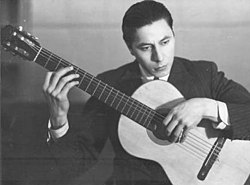Atahualpa Yupanqui
| Atahualpa Yupanqui | |
|---|---|

Yupanqui in 1935.
|
|
| Background information | |
| Birth name | Héctor Roberto Chavero Aramburu |
| Born | 31 January 1908 |
| Origin | Pergamino, Buenos Aires, Argentina |
| Died | 23 May 1992 (aged 84) Nîmes, France |
| Genres | Payada, trova |
| Occupation(s) | Singer, songwriter, writer |
| Instruments | Guitar, vocals |
Atahualpa Yupanqui (Spanish pronunciation: [ataˈwalpa ʝuˈpaŋki]; 31 January 1908 – 23 May 1992) (in Quechua, He who comes from faraway lands to say something was an Argentine singer, songwriter, guitarist, and writer. He is considered the most important Argentine folk musician of the 20th century.
Yupanqui was born Héctor Roberto Chavero Aramburu in Pergamino (Buenos Aires Province), in the Argentine pampas, about 200 kilometers away from Buenos Aires. His father was a mestizo descended from indigenous people, while his mother was born in the Basque country. His family moved to Tucumán when he was ten. In a bow to two legendary Incan kings, he adopted the stage name Atahualpa Yupanqui, which became famous the world over.
In his early years, Yupanqui travelled extensively through the northwest of Argentina and the Altiplano studying the indigenous culture. He became politically active and joined the Communist Party of Argentina. In 1931, he took part in the failed Kennedy brothers uprising against the de facto government of José Félix Uriburu and in support of deposed president Hipólito Yrigoyen. After the uprising was defeated, he was forced to seek refuge in Uruguay. He returned to Argentina in 1934.
In 1935, Yupanqui paid his first visit to Buenos Aires; his compositions were growing in popularity, and he was invited to perform on the radio. Shortly thereafter, he made the acquaintance of pianist Antonieta Paula Pepin Fitzpatrick, nicknamed "Nenette", who became his lifelong companion and musical collaborator under the pseudonym "Pablo Del Cerro".
...
Wikipedia
